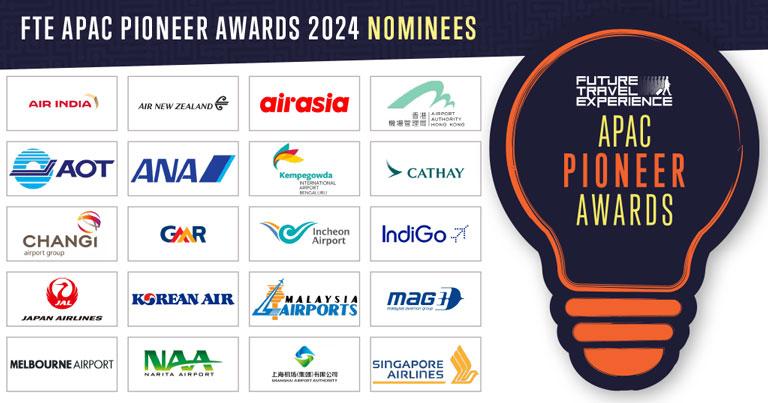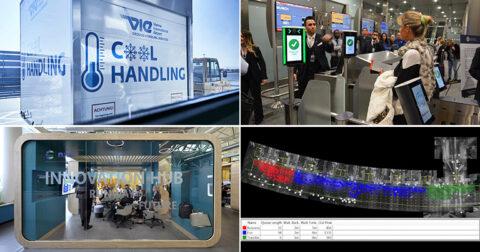The shortlists for the FTE APAC Pioneer Awards 2024 have been unveiled ahead of the presentation ceremony at the free-to-attend FTE APEX Asia Expo, which will take place in Singapore on 19-20 November. Read our full awards preview in which we highlight how these 20 pioneering airlines and airports from across Asia-Pacific are pushing the boundaries of innovation, enhancing the customer experience, and playing a vital role in advancing the air transport industry. 10 of the 20 nominees will be presented with an ‘Outstanding Achievement’ trophy during the presentation ceremony in Singapore. Congratulations to all of the airlines and airport operators that have been nominated.
FTE APAC Airline Pioneer Awards 2024 nominees:
Singapore Airlines
 Singapore Airlines is taking a collaborative approach to ensuring it remains at the forefront of technological advancements and customer-centric innovation. This approach is multifaceted, collaborating with other airlines, industry stakeholders, technology partners, research and development institutions, as well as open innovation ecosystem partners to exchange knowledge, co-develop solutions and drive innovation in the travel and aviation sector. Indeed, Singapore Airlines recently signed a Memorandum of Understanding to collaborate on the International Aviation Lab established by the Civil Aviation Authority of Singapore to jointly explore, initiate and undertake innovation projects.
Singapore Airlines is taking a collaborative approach to ensuring it remains at the forefront of technological advancements and customer-centric innovation. This approach is multifaceted, collaborating with other airlines, industry stakeholders, technology partners, research and development institutions, as well as open innovation ecosystem partners to exchange knowledge, co-develop solutions and drive innovation in the travel and aviation sector. Indeed, Singapore Airlines recently signed a Memorandum of Understanding to collaborate on the International Aviation Lab established by the Civil Aviation Authority of Singapore to jointly explore, initiate and undertake innovation projects.
The airline works closely with open innovation communities, startups and entrepreneurs through its Digital Innovation Lab, KrisLab, to explore and experiment with new, emerging and innovative technologies and solutions – whether they are from the travel and aviation space or other verticals. An example is Singapore Airlines’ partnership with a startup to develop a crew language competency app that leverages Artificial Intelligence (AI) and speech recognition technology. This offers crew a platform to enhance their delivery of onboard announcements through asynchronous learning, enabling them to enhance their language skills and improve their enunciation.
Singapore Airlines is also embracing Generative AI (Gen AI) and has developed a blueprint for its implementation across the organisation. The blueprint is a strategic plan aimed at identifying impactful Gen AI use cases, exemplifying the airline’s commitment to leverage emerging technologies to improve operations and enhance customer experiences.
Meanwhile, as part of its comprehensive sustainability strategy, Singapore Airlines is on a journey to have a minimum of 5% Sustainable Aviation Fuel (SAF) in its total fuel uplift by 2030. Close collaboration with partners and stakeholders, both in Singapore and globally, is playing a critical role in the airline’s long-term decarbonisation goals. Earlier this year, Singapore Airlines signed an agreement with Neste to purchase 1,000 tonnes of neat Neste MY Sustainable Aviation Fuel.
Singapore Airlines is a Headline Partner of FTE APEX Asia Expo, taking place in Singapore on 19-20 November 2024.
View the FTE APEX Asia Expo 2024 schedule at a glance >> Register for FTE APEX Asia Expo 2024 >>AirAsia
 AirAsia describes itself as “a progressive and guest-focused airline”. The carrier has fast-tracked its digital transformation with the mission of pivoting from being primarily an airline into an all-in-one digital company with close to 20 travel and lifestyle products and services creating the “AirAsia way of life”. AirAsia on a transformative journey “to elevate every traveller’s experience”. As the first step on this journey, AirAsia MOVE – formerly known as airasia Superapp – has unveiled an updated, refreshed look for its app. From the app layout, to exciting new products, services and deals, the new AirAsia MOVE is designed to help customers “go all the way” seamlessly when they travel. AirAsia MOVE envisions travel complemented by a community-led experience through features such as AirAsia Chat, games, gifting, and a strong loyalty programme that rewards users across its expansive ecosystem.
AirAsia describes itself as “a progressive and guest-focused airline”. The carrier has fast-tracked its digital transformation with the mission of pivoting from being primarily an airline into an all-in-one digital company with close to 20 travel and lifestyle products and services creating the “AirAsia way of life”. AirAsia on a transformative journey “to elevate every traveller’s experience”. As the first step on this journey, AirAsia MOVE – formerly known as airasia Superapp – has unveiled an updated, refreshed look for its app. From the app layout, to exciting new products, services and deals, the new AirAsia MOVE is designed to help customers “go all the way” seamlessly when they travel. AirAsia MOVE envisions travel complemented by a community-led experience through features such as AirAsia Chat, games, gifting, and a strong loyalty programme that rewards users across its expansive ecosystem.
Using technology to increase efficiency and sustainability is a core focus. As part of this AirAsia is embracing Advanced Air Mobility in collaboration with Avolon-e. They are partnering to commercialise zero-emission eVTOL aircraft and develop an industry-leading Urban Air Mobility platform in Southeast Asia. This also involves leveraging AirAsia MOVE to help support and build an eVTOL ride-sharing platform with Avolon.
Hear more from AirAsia at FTE APEX Asia Expo, taking place in Singapore on 19-20 November 2024. Paul Carroll, Chief Commercial Officer, AirAsia Group, will deliver the Expo Stage Opening Keynote: ‘How AirAsia Group is embracing digital transformation to redefine retailing, differentiate its business, and elevate the air travel experience’.
View the FTE APEX Asia Expo 2024 schedule at a glance >> Register for FTE APEX Asia Expo 2024 >>Cathay Pacific
 Cathay Pacific has a renewed focus on the customer and recently launched a new master brand to simplify the way travellers interact with the airline. Pioneering enhancements to the customer experience include the all-new business class Aria Suite, featuring in Cathay’s redesigned Boeing 777-300ER cabins since Q2 2024, through to significant sustainability efforts and an impressive IFEC upgrade.
Cathay Pacific has a renewed focus on the customer and recently launched a new master brand to simplify the way travellers interact with the airline. Pioneering enhancements to the customer experience include the all-new business class Aria Suite, featuring in Cathay’s redesigned Boeing 777-300ER cabins since Q2 2024, through to significant sustainability efforts and an impressive IFEC upgrade.
The airline is continuously pursuing the development of new technologies that enable the airline to give customers more choice and control over their journeys, whether on the ground, in the air or on digital channels. As part of these efforts, Cathay is embracing advanced conversational AI to enhance customers’ digital experience. Under the airline’s conversational AI roadmap, Cathay is optimising its digital customer experience with the most cutting-edge language AI technologies.
The airline has also launched an intuitive booking platform, contactless boarding, and high-speed Wi-Fi. Indeed, customers travelling in First or Business class onboard connected Cathay Pacific aircraft can now enjoy complimentary Wi-Fi service on their flight – the latest enhancement the airline is making to the inflight customer experience.
The airline is also recognised for its leadership in sustainability. Its drive towards decarbonisation will see Sustainable Aviation Fuel (SAF) account for 10% of total fuel consumption by 2030, and as part of that Cathay has launched Asia’s first major ‘Corporate SAF Programme’. Cathay is also extending its carbon-offset programme and has surpassed its target to cut single-use plastics, with a 56% reduction in single-use plastics use on a per-passenger level compared to a 2018 baseline.
Hear more from Cathay Pacific in the Premium Conference at FTE APEX Asia Expo, taking place in Singapore on 19-20 November 2024. Vivian Lo, GM Customer Experience and Design, Cathay Pacific, is participating in a session focused on ‘Inflight Innovation – elevating the onboard experience through cutting-edge cabin, IFEC and service advancements’. Meanwhile, Gordon Chu, Head of Digital Innovation, Cathay Pacific, is speaking in ‘The FTE Digital Transformation Symposium – how airlines, airports and their partners are leveraging technology to redefine operational efficiency and prepare for the future’.
View the FTE APEX Asia Expo 2024 schedule at a glance >> Register for FTE APEX Asia Expo 2024 >>IndiGo
 IndiGo is on a comprehensive digital transformation journey. The airline is leveraging advanced cloud technologies, including Artificial Intelligence, Machine Leaning, and data analytics to deliver pioneering solutions and adapt to new industry trends. As part of this process, IndiGo recently concluded its ambitious and intensive cloud migration initiative. This strategic transition enhances scalability, performance and customer service agility.
IndiGo is on a comprehensive digital transformation journey. The airline is leveraging advanced cloud technologies, including Artificial Intelligence, Machine Leaning, and data analytics to deliver pioneering solutions and adapt to new industry trends. As part of this process, IndiGo recently concluded its ambitious and intensive cloud migration initiative. This strategic transition enhances scalability, performance and customer service agility.
The airline also recently announced a strategic collaboration with GMR Hyderabad International Airport, with the aim of transforming the passenger experience. The initiative forms the beginning of a digital consortium whose objective is to reshape the landscape of the Indian aviation industry. The consortium is focused on deploying cutting-edge technologies to enhance operational efficiency, passenger experiences, and overall industry sustainability, including Artificial Intelligence (AI) and the Internet of Things (IoT) as well as Blockchain and Data Mesh. While IndiGo and GMR are the founding partners of this industry consortium, the initiative aims to collaborate with multiple stakeholders in the aviation ecosystem to advance the key objectives of driving technological innovation, enhancing passenger services, achieving operational excellence, and embracing sustainable practices to minimise environmental impact.
IndiGo is embarking on an additional new path by introducing this year a tailor-made business product for its A321neo aircraft. Deliveries are scheduled to begin in Q4 2024, and all business class installations are expected to be completed by the end of 2025.
Meanwhile, in May IndiGo selected portable inflight entertainment (IFE) provider AirFi to embark on a trial of wireless, streaming inflight entertainment. It hopes that AirFi’s wireless IFE portal, which is available through the IndiGo mobile app, will prove to be a useful tool for improving the customer experience for digital-savvy passengers.
Hear more from IndiGo in the Premium Conference at FTE APEX Asia Expo, taking place in Singapore on 19-20 November 2024. Pieter Elbers, CEO, IndiGo, is a keynote speaker and will participate in a CEO Fireside Chat with Suranjana Tewari, Asia Business Reporter, BBC News.
View the FTE APEX Asia Expo 2024 schedule at a glance >> Register for FTE APEX Asia Expo 2024 >>Air New Zealand
 Air New Zealand is shortlisted for its Mission Next Gen Aircraft programme – its initiative to accelerate the development and introduction of zero emissions aircraft technology for the regional fleet in New Zealand. The airline has announced the ALIA as the airline’s first purchase of a next-generation aircraft. Designed by electric aerospace company BETA Technologies, the battery-powered all-electric aircraft is expected to join Air New Zealand’s fleet in 2026. Air New Zealand is purchasing the conventional take-off and landing version of the ALIA. The announcement followed an 18-month period of evaluation and diligence by Air New Zealand. Through the airline’s Mission Next Gen Aircraft programme, it sought and received ideas and insights from 30 organisations, selecting four partners to work closely with on its goal of launching commercial flights using next-generation aircraft in 2026. BETA’s ALIA is the first commercial order in the programme. It is a small but important step in a much larger journey for Air New Zealand towards decarbonising aviation. Indeed, Mission Next Gen Aircraft is not about backing one innovator. It’s about working with a range of leaders in zero emissions aircraft technology to help move the whole ecosystem along.
Air New Zealand is shortlisted for its Mission Next Gen Aircraft programme – its initiative to accelerate the development and introduction of zero emissions aircraft technology for the regional fleet in New Zealand. The airline has announced the ALIA as the airline’s first purchase of a next-generation aircraft. Designed by electric aerospace company BETA Technologies, the battery-powered all-electric aircraft is expected to join Air New Zealand’s fleet in 2026. Air New Zealand is purchasing the conventional take-off and landing version of the ALIA. The announcement followed an 18-month period of evaluation and diligence by Air New Zealand. Through the airline’s Mission Next Gen Aircraft programme, it sought and received ideas and insights from 30 organisations, selecting four partners to work closely with on its goal of launching commercial flights using next-generation aircraft in 2026. BETA’s ALIA is the first commercial order in the programme. It is a small but important step in a much larger journey for Air New Zealand towards decarbonising aviation. Indeed, Mission Next Gen Aircraft is not about backing one innovator. It’s about working with a range of leaders in zero emissions aircraft technology to help move the whole ecosystem along.
Air New Zealand is also on a journey to be “a leading digital airline globally” and is increasingly looking to digital technologies to enhance the experiences it delivers to customers. Innovations include an Artificial Intelligence chatbot called Oscar, a coffee ordering feature in the Air New Zealand app for customers using certain airport lounges, and more.
Korean Air
![]() As national carrier of one of the world’s most digitally connected countries, Korean Air is spearheading its digital transformation journey.
As national carrier of one of the world’s most digitally connected countries, Korean Air is spearheading its digital transformation journey.
The airline is recognised for its efforts to incorporate innovative Artificial Intelligence (AI) technologies to improve the customer experience, notably through a recent partnership with Amazon Web Services (AWS) to develop an AI Contact Center (AICC) platform that incorporates innovative AI tech. The AICC is a cloud-based intelligent customer service platform that uses AI to power voice bots and chatbots to answer customer enquiries. By utilising an AICC, it can offer more personalised and efficient customer support through innovative AI and cloud technologies, surpassing basic call centre services. Following this, the airline aims to further refine its services with the integration of Machine Learning and Generative AI by February 2025.
To build a culture of cloud innovation, Korean Air introduced the AWS Innovation Builder Program during its cloud migration to give employees the right skillsets to become data- and customer-centric and create a cloud-first culture. As part of this company-wide effort, Korean Air equipped 500 employees with basic cloud technology skills and brought the business and technology teams together to validate new ideas with speed and agility using AWS.
Korean Air has also recently redefined its Business Class experience, with the new Prestige Class cabin interior introduced on its brand-new Boeing 787-10 aircraft.
Air India
 Air India is on a five-year transformation journey known as Vihaan.AI. Vihaan.AI, which in Sanskrit signifies the dawn of a new era, is a detailed roadmap for Air India with clear milestones focusing on dramatically growing both its network and fleet, developing a completely revamped customer proposition, improving reliability and on-time performance, and taking a leadership position in technology, sustainability, and innovation. The first two phases of this transformation, ‘Taxi’ and ‘Take-off’, were focused on fixing the basics and building foundations for growth. The airline has now entered the ‘Climb’ phase, which focuses on achieving excellence in operations and customer experience.
Air India is on a five-year transformation journey known as Vihaan.AI. Vihaan.AI, which in Sanskrit signifies the dawn of a new era, is a detailed roadmap for Air India with clear milestones focusing on dramatically growing both its network and fleet, developing a completely revamped customer proposition, improving reliability and on-time performance, and taking a leadership position in technology, sustainability, and innovation. The first two phases of this transformation, ‘Taxi’ and ‘Take-off’, were focused on fixing the basics and building foundations for growth. The airline has now entered the ‘Climb’ phase, which focuses on achieving excellence in operations and customer experience.
The airline has also introduced AEYE Vision – an innovative feature in the Air India mobile app, which is designed to elevate the customer experience using Artificial Intelligence, Augmented Reality, and advanced camera technology. This feature leverages the mobile device’s camera to streamline various travel-related tasks, transforming passenger interactions with the Air India app. Air India is the first airline to integrate these technologies in a single platform.
Hear more from Air India at FTE APEX Asia Expo, taking place in Singapore on 19-20 November 2024. Andrew Tan, Vice President Airport Development PMO (CEO’s office), Air India, is participating in a session focused on ‘How airlines and airports are combining technology, unique products and exceptional service to deliver world-class customer experiences’, with a presentation titled ‘How Air India is enhancing the customer and employee experience with creative digital developments’.
Meanwhile, Mir Amer Hussain, Head – Product (Onboard) & IFE&C, Air India, is participating in a session on ‘Tapping into the latest IFEC advancements to differentiate your brand and create memorable experiences’, and Juli Ng, Divisional Vice President of Cabin Crew, Air India, is speaking in an Onboard Hospitality Forum Asia session on ‘Improving the inflight experience for passengers, and the latest onboard product innovations’.
View the FTE APEX Asia Expo 2024 schedule at a glance >> Register for FTE APEX Asia Expo 2024 >>All Nippon Airways
 All Nippon Airways (ANA) is continuing its digital transformation journey, with plans to streamline its passenger service systems from FY2025 for “a seamless travel experience”.
All Nippon Airways (ANA) is continuing its digital transformation journey, with plans to streamline its passenger service systems from FY2025 for “a seamless travel experience”.
The airline has entered the Metaverse with ANA NEO and, as part of this, has launched ANA Granwhale – a virtual travel platform. Leveraging the power of virtual travel, this platform aims to enhance the number of inbound travellers to Japan, as well as promoting and facilitating the sale of specialty and regional products through e-commerce. Meanwhile, ANA Smart Travel aims to provide customers with a smooth and stress-free travel experience. The service model enables passengers to use their smartphones throughout their journey, with the intention of improving convenience and promoting contactless travel. Through these efforts, ANA aims to improve customer experience value, while strengthening its competitiveness and pursuing business efficiencies at the same time.
Meanwhile, ANA this summer started offering a complimentary WiFi service for its Business Class passengers on international flights. ANA’s Premium Economy and Economy Class passengers will have access to complimentary texting with the WiFi service on international flights by the end of March 2025. This is part of ongoing efforts to expand inflight services to provide customers with an even more enjoyable and connected experience onboard.
ANA is also entering the Urban Air Mobility space, in partnership with Joby Aviation, and plans to operate demonstration flights during Expo 2025 in Osaka, Kansai, Japan.
Malaysia Aviation Group
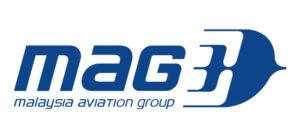 The Malaysia Aviation Group (MAG) airlines portfolio includes Malaysia Airlines, Firefly, MASwings, and AMAL by Malaysia Airlines. MAG is reinforcing its commitment to digital empowerment and embracing cutting-edge technologies. In a strategic move towards advancing its digital transformation journey, MAG has expanded its work on the Microsoft platform in Malaysia to enhance the Group’s suite of offerings, enrich user experiences, and fortify its technology platforms. As part of this extended collaboration, MAG is innovating in the areas of autonomous vehicles, data analytics, Artificial Intelligence (AI), Machine Learning, Augmented Reality, robotics and more.
The Malaysia Aviation Group (MAG) airlines portfolio includes Malaysia Airlines, Firefly, MASwings, and AMAL by Malaysia Airlines. MAG is reinforcing its commitment to digital empowerment and embracing cutting-edge technologies. In a strategic move towards advancing its digital transformation journey, MAG has expanded its work on the Microsoft platform in Malaysia to enhance the Group’s suite of offerings, enrich user experiences, and fortify its technology platforms. As part of this extended collaboration, MAG is innovating in the areas of autonomous vehicles, data analytics, Artificial Intelligence (AI), Machine Learning, Augmented Reality, robotics and more.
Malaysia Airlines recently unveiled an innovative collaboration with Google, which is designed to further drive digital evolution. By harnessing cutting-edge digital marketing and AI marketing solutions to enhance its commercial operations, streamline processes and provide tailored experiences to travellers, this collaboration aims to foster ongoing growth and innovation, cultivating a holistic ecosystem that prioritises a seamless customer experience.
Meanwhile, Malaysia Airlines has streamlined the interlining process with its CarrierConnect solution via its website or mobile app, as well as introducing MCAT Solution as an innovative platform to revolutionise inflight catering operations. MCAT Solution seamlessly displays real-time flight information, packing lists for each team involved, track and trace and inventory management, while simultaneously capturing this data to present on a dynamic performance dashboard. The mobile web app leverages data analysis and automation to simplify every step of the catering-to-aircraft process, from managing supplies and carts to distribution.
Japan Airlines Group
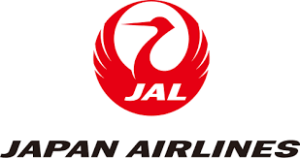 Japan Airlines’ (JAL) ‘Vision 2030’ aims to drive future growth with a focus on “safety, peace of mind and sustainability”. Taking a leadership role in sustainability, JAL became the world’s first airline group to join the Global Sustainable Tourism Council (GSTC) – an international organisation that establishes and manages global standards for sustainable travel and tourism. JAL is also part of a pioneering initiative to promote the use of Sustainable Aviation Fuel (SAF) and decarbonise aviation, alongside six other companies. To encourage the use of SAF, the project is aimed at building a new scheme for trading Scope 3 emissions. As the first step, the seven companies have agreed to conduct a demonstration test of Scope 3 environmental value trading to verify the concept behind the new scheme. The use of this scheme by a large number of companies involved in air transport will generate substantial opportunities to drive the widespread uptake of SAF throughout Japan.
Japan Airlines’ (JAL) ‘Vision 2030’ aims to drive future growth with a focus on “safety, peace of mind and sustainability”. Taking a leadership role in sustainability, JAL became the world’s first airline group to join the Global Sustainable Tourism Council (GSTC) – an international organisation that establishes and manages global standards for sustainable travel and tourism. JAL is also part of a pioneering initiative to promote the use of Sustainable Aviation Fuel (SAF) and decarbonise aviation, alongside six other companies. To encourage the use of SAF, the project is aimed at building a new scheme for trading Scope 3 emissions. As the first step, the seven companies have agreed to conduct a demonstration test of Scope 3 environmental value trading to verify the concept behind the new scheme. The use of this scheme by a large number of companies involved in air transport will generate substantial opportunities to drive the widespread uptake of SAF throughout Japan.
JAL is also entering the Urban Air Mobility space and plans to operate eVTOL demonstration flights during Expo 2025 in Osaka, Kansai, Japan. In order to help facilitate this, in June 2024 JAL and Sumitomo Corporation established Soracle Corporation – a joint venture to operate eVTOL aircraft.
Meanwhile, ZIPAIR – JAL Group’s “super cool” low-cost carrier – is digitally-native and focused on disruptive innovation, including streamlined entertainment, seamless inflight services, and Artificial Intelligence announcements.
FTE APAC Airport Operators Pioneer Awards 2024 nominees:
Changi Airport Group
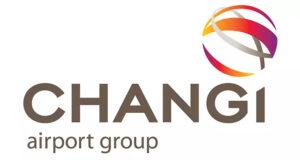 Changi Airport Group is nominated for its efforts in the robotics and automation space. It has been conducting extensive trials on the use of autonomous vehicles at the airside to augment its airside workers in the transporting, loading and unloading of baggage containers. As part of this, Changi has agreed to bring in a fleet of four autonomous baggage handling vehicles to pilot underwing operations at the airport, developed by Aurrigo. The recently-concluded Phase 2A of the trial tested the Auto-DollyTug at Changi Airport, showcasing its resilience in different conditions, including wet weather, heat, humidity, alignment to airport equipment, automated transfer of baggage containers and close quarter operations to aircraft on stand. Over the course of the past two years, the Auto-DollyTug has demonstrated its ability to manoeuvre on the apron while interacting with traditional ground service equipment (GSE). Looking ahead, Phase 2B will focus on testing the Auto-DollyTug’s fleet communication through Aurrigo’s Auto-Connect platform, enabling them to be scheduled and monitored to support the turnaround of a wide-body flight.
Changi Airport Group is nominated for its efforts in the robotics and automation space. It has been conducting extensive trials on the use of autonomous vehicles at the airside to augment its airside workers in the transporting, loading and unloading of baggage containers. As part of this, Changi has agreed to bring in a fleet of four autonomous baggage handling vehicles to pilot underwing operations at the airport, developed by Aurrigo. The recently-concluded Phase 2A of the trial tested the Auto-DollyTug at Changi Airport, showcasing its resilience in different conditions, including wet weather, heat, humidity, alignment to airport equipment, automated transfer of baggage containers and close quarter operations to aircraft on stand. Over the course of the past two years, the Auto-DollyTug has demonstrated its ability to manoeuvre on the apron while interacting with traditional ground service equipment (GSE). Looking ahead, Phase 2B will focus on testing the Auto-DollyTug’s fleet communication through Aurrigo’s Auto-Connect platform, enabling them to be scheduled and monitored to support the turnaround of a wide-body flight.
Meanwhile, on robotics, Changi has deployed the use of cleaning robots to clean the vast terminal floor areas, as well as grass cutting robots to help maintain the turf at the airside. The airport sees that the use of robotics and autonomous vehicles can help to fulfil routine, rule-based tasks, which improves overall productivity by augmenting the existing workforce. Leveraging these ‘intelligent tools’ is a key enabler in ensuring operations can continue to run smoothly, facilitating a seamless experience for all travellers.
Changi Airport Group also recently signed a Memorandum of Understanding to collaborate on the International Aviation Lab established by the Civil Aviation Authority of Singapore to jointly explore, initiate and undertake innovation projects.
Changi Airport Group is a Headline Partner of FTE APEX Asia Expo, taking place in Singapore on 19-20 November 2024. Hear more from Changi Airport Group in the Premium Conference – Jayson Goh, Executive Vice President, Airport Management, Changi Airport Group, is participating in the ‘Aviation Leaders Keynote Panel – identifying opportunities, overcoming challenges and embracing innovation to support future growth across Asia and beyond’.
Meanwhile, Chua Ching Hock, General Manager – Seletar Airport, Changi Airport Group, is participating in ‘The Airport Innovation Summit’ with a presentation titled ‘Innovation in smaller airports – the Seletar Airport journey’.
View the FTE APEX Asia Expo 2024 schedule at a glance >> Register for FTE APEX Asia Expo 2024 >>Airport Authority Hong Kong
 Airport Authority Hong Kong is recognised for further progress on its ‘Smart Airport’ journey at Hong Kong International Airport (HKIA), with the launch of a Smartphone Express Bag Drop Service. A development of HKIA’s Flight Token smart technology, the new service enables passengers to complete online check-in and scan their travel documents with their smartphones before heading to the airport. Upon arrival at HKIA, they can proceed directly to the Express Bag Drop counters and drop their bags by themselves with their smartphones in under one minute, compared to an average of three minutes at the airline counters or Smart Check-in Kiosks.
Airport Authority Hong Kong is recognised for further progress on its ‘Smart Airport’ journey at Hong Kong International Airport (HKIA), with the launch of a Smartphone Express Bag Drop Service. A development of HKIA’s Flight Token smart technology, the new service enables passengers to complete online check-in and scan their travel documents with their smartphones before heading to the airport. Upon arrival at HKIA, they can proceed directly to the Express Bag Drop counters and drop their bags by themselves with their smartphones in under one minute, compared to an average of three minutes at the airline counters or Smart Check-in Kiosks.
Passengers are able to complete all departure procedures using only their smartphones and facial recognition technology, including online check-in, travel document verification, bag drop, entering the security area, and boarding through self-service.
The airport explains that Flight Token is the world’s first service that applies facial recognition technology to complete the entire departure process at the airport. The Smartphone Express Bag Drop Service, as an extended service of Flight Token, has been launched in collaboration with airlines, delivering to passengers an even more convenient and efficient departure experience. HKIA continues to work with its business partners to develop and adopt different technological and innovative solutions to further enhance services and operational efficiency as part of its ‘Smart Airport’ journey.
Incheon Airport
 Incheon Airport is shortlisted for its pioneering approach to baggage transformation. Incheon is participating in the groundbreaking BOOST initiative designed to transform the future of baggage handling through robotics and automation, which has been developed in partnership with Future Travel Experience via the Baggage Innovation Working Group. Each airport partner in BOOST will tackle a specific technical challenge in automating the baggage process – Incheon is demonstrating an odd-sized baggage handling concept by utilising Doosan Robotics to automate the handling of irregularly sized and heavy baggage, classifying and transporting to each terminal building. This will alleviate the workload for baggage handlers and enhance operational efficiency. Each core member of BOOST will work on a unique technical challenge, conducting onsite proof of concepts (POCs) to test robotics and other technologies. Information and insights from these POCs will be shared with the other core partners, and the wider BIWG community on a regular basis, allowing all to benefit from multiple tests without having to execute them independently. This collaborative approach aims to speed up the innovation process across all participating airports.
Incheon Airport is shortlisted for its pioneering approach to baggage transformation. Incheon is participating in the groundbreaking BOOST initiative designed to transform the future of baggage handling through robotics and automation, which has been developed in partnership with Future Travel Experience via the Baggage Innovation Working Group. Each airport partner in BOOST will tackle a specific technical challenge in automating the baggage process – Incheon is demonstrating an odd-sized baggage handling concept by utilising Doosan Robotics to automate the handling of irregularly sized and heavy baggage, classifying and transporting to each terminal building. This will alleviate the workload for baggage handlers and enhance operational efficiency. Each core member of BOOST will work on a unique technical challenge, conducting onsite proof of concepts (POCs) to test robotics and other technologies. Information and insights from these POCs will be shared with the other core partners, and the wider BIWG community on a regular basis, allowing all to benefit from multiple tests without having to execute them independently. This collaborative approach aims to speed up the innovation process across all participating airports.
Incheon is also notable for its Extended Reality (XR) Metaverse, which provides an indoor wayfinding service based on 3D spatial data and Augmented Reality technology.
Hear more from Incheon Airport in the Premium Conference at FTE APEX Asia Expo, taking place in Singapore on 19-20 November 2024. Soonil Hwang, Deputy Director, Fast Travel Team, Incheon International Airport Corporation, and Jeong-ju An, Manager of Fast Travel Team, Incheon International Airport Corporation, are participating in ‘The Airport Innovation Summit’ with a joint presentation titled ‘How is the Fast Travel programme successfully elevating the customer experience and optimising efficiency at Incheon Airport, and what is planned next?’
View the FTE APEX Asia Expo 2024 schedule at a glance >> Register for FTE APEX Asia Expo 2024 >>GMR Group
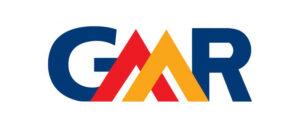 GMR is at the forefront in terms of development and adoption of technological innovations in the region. As one of the largest private airport companies in India, GMR Group is driving several initiatives to enhance business prospects in terms of superior customer experiences, revenue enhancement and cost reduction opportunities, as well as agile and efficient internal processes. To foster an innovation culture and build a philosophy of open innovation that enables the free flow of ideas and resources between GMR and external ecosystem partners, GMR Innovex, the innovation vertical of GMR, was established. GMR Innovex recently introduced a Next-Gen Intelligent Airport Operating System (iAOS) – a ground-breaking platform leveraging Artificial Intelligence (AI), Machine Learning (ML), and the Internet of Things (IoT) to transform airport operations. By creating a digital twin of the airport, iAOS offers a comprehensive, real-time view of airside, landside, and terminal activities, empowering airports to become smarter, more efficient, and passenger-centric. By leveraging AI, ML and IoT, iAOS has the potential to set a new industry standard for intelligent airport management.
GMR is at the forefront in terms of development and adoption of technological innovations in the region. As one of the largest private airport companies in India, GMR Group is driving several initiatives to enhance business prospects in terms of superior customer experiences, revenue enhancement and cost reduction opportunities, as well as agile and efficient internal processes. To foster an innovation culture and build a philosophy of open innovation that enables the free flow of ideas and resources between GMR and external ecosystem partners, GMR Innovex, the innovation vertical of GMR, was established. GMR Innovex recently introduced a Next-Gen Intelligent Airport Operating System (iAOS) – a ground-breaking platform leveraging Artificial Intelligence (AI), Machine Learning (ML), and the Internet of Things (IoT) to transform airport operations. By creating a digital twin of the airport, iAOS offers a comprehensive, real-time view of airside, landside, and terminal activities, empowering airports to become smarter, more efficient, and passenger-centric. By leveraging AI, ML and IoT, iAOS has the potential to set a new industry standard for intelligent airport management.
With a major focus on airports and with a broad array of industries under its span, GMR Group is investing in cloud technologies, video analytics, computer vision, data sciences, blockchain, DroneTech, smart tagging, AI/ML, contactless technology, AR/VR, IoT, and Human Machine Interactions (HMI Bots), just to name a few.
Meanwhile, in April 2024, GMR Group acquired an 8.4% stake in WAISL, to further its efforts to deliver world-class, end-to-end digital infrastructure.
Airports of Thailand
 The Airports of Thailand (AOT) vision is to operate “the world’s smartest airports”, and innovation and digital technologies are central to its operations strategy. AOT has continuously applied Information Communication Technology (ICT) to support airport operation and internal affairs management. It has created a Digital Action Plan, which consists of the following elements: elevating service quality and security by applying ICT innovation; developing information systems and applying technology to increase management efficiency; strengthening its digital workforce; and developing and improving the ICT infrastructure to increase capability and support future demands. AOT has set the direction in applying digital technology to enhance the passenger experience under the concept of “A Life Airport”. Highlights of AOT’s innovation projects include fast automatic self-check-in kiosks for passengers; self-bag-drop points with barcode luggage tags for effective tracking and management; passenger baggage reconciliation system; advanced passenger processing system; and the AOT mobile app, which provides passengers with real-time flight status, as well as information on shops and restaurants at the airports.
The Airports of Thailand (AOT) vision is to operate “the world’s smartest airports”, and innovation and digital technologies are central to its operations strategy. AOT has continuously applied Information Communication Technology (ICT) to support airport operation and internal affairs management. It has created a Digital Action Plan, which consists of the following elements: elevating service quality and security by applying ICT innovation; developing information systems and applying technology to increase management efficiency; strengthening its digital workforce; and developing and improving the ICT infrastructure to increase capability and support future demands. AOT has set the direction in applying digital technology to enhance the passenger experience under the concept of “A Life Airport”. Highlights of AOT’s innovation projects include fast automatic self-check-in kiosks for passengers; self-bag-drop points with barcode luggage tags for effective tracking and management; passenger baggage reconciliation system; advanced passenger processing system; and the AOT mobile app, which provides passengers with real-time flight status, as well as information on shops and restaurants at the airports.
Narita International Airport Corporation
 Narita International Airport’s ‘AIR Narita’ system innovation project was launched to rebuild multiple systems into an integrated format as a means of overcoming the labour shortage, promoting workstyle reforms and remaining ahead of the competition between airports. In this project, the airport builds the foundations for continuous business optimisation by integrating all services and systems into one across all departments with the main aim to contribute to the sustainable growth of the airport. The airport is proactively incorporating robotics, Artificial Intelligence (AI) and other cutting-edge information and communications technologies to promote business efficiency and enhanced productivity. The airport is promoting the use of vehicles with driverless technology at Narita International Airport to overcome the shortage of labour due to the decline in the country’s working age population. Meanwhile, the airport is also moving forward with the use of AI with the aim to improve customer satisfaction. Narita has introduced an AI chatbot service, called BEBOT, to provide real-time responses in chat format to customer questions and requests. Narita International Airport Corporation has also introduced Japan’s first end-to-end biometric boarding process, enabling passengers to travel through the entire airport without using paper documents or touching screens.
Narita International Airport’s ‘AIR Narita’ system innovation project was launched to rebuild multiple systems into an integrated format as a means of overcoming the labour shortage, promoting workstyle reforms and remaining ahead of the competition between airports. In this project, the airport builds the foundations for continuous business optimisation by integrating all services and systems into one across all departments with the main aim to contribute to the sustainable growth of the airport. The airport is proactively incorporating robotics, Artificial Intelligence (AI) and other cutting-edge information and communications technologies to promote business efficiency and enhanced productivity. The airport is promoting the use of vehicles with driverless technology at Narita International Airport to overcome the shortage of labour due to the decline in the country’s working age population. Meanwhile, the airport is also moving forward with the use of AI with the aim to improve customer satisfaction. Narita has introduced an AI chatbot service, called BEBOT, to provide real-time responses in chat format to customer questions and requests. Narita International Airport Corporation has also introduced Japan’s first end-to-end biometric boarding process, enabling passengers to travel through the entire airport without using paper documents or touching screens.
Narita International Airport Corporation recently selected Collins Aerospace to deploy systems to improve the passenger experience through streamlined processing and self-service kiosks. ARINC cMUSE, the airport’s Common-Use Passenger Processing System will enable multiple airlines to share desks and boarding gate positions within the Narita Airport terminal in lieu of an airline being anchored to one check-in desk or gate. This flexibility allows airlines to rapidly change locations based on availability and reduce passenger wait times. Additionally, ARINC SelfServ Common-Use Self-Service kiosks speed the check-in process for travellers, allowing passengers to check bags and print boarding passes independently without the need to wait for an airport employee.
Shanghai Hongqiao International Airport
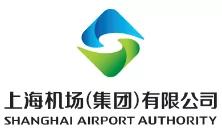 Shanghai Hongqiao International Airport is enhancing the passenger experience and operational efficiency with Artificial Intelligence (AI)-powered solutions coupled with Machine Learning (ML) algorithms. While enhancing its previously-installed Airport Operational Database/Resource Management System (AODB/RMS), the airport has implemented a new prediction model applying advanced AI/ML techniques and data analytics to help calculate an aircraft’s ETA and pre-allocate flight stands. It is designed to reduce unreasonable stand adjustments and improve the airbridge usage rate, lowering overall security risks caused by flight conflicts. Thanks to the AI prediction algorithm, 75% of Shanghai Hongqiao’s flights now land within 30 minutes of their scheduled landing time. This improved accuracy has directly benefited the pre-allocation of stands, reducing the need to make stand changes by 25%. This has decreased security risks caused by flight conflicts, as well as allowed more passengers to avail airbridges rather than wait for buses, while demonstrating how digital technologies are playing a key role in optimising the operational efficiency of the airport. Meanwhile, Shanghai Hongqiao International Airport has also built the first airport parking lot in China that provides charging services for electric vehicles and dedicated queue channels for new energy taxis.
Shanghai Hongqiao International Airport is enhancing the passenger experience and operational efficiency with Artificial Intelligence (AI)-powered solutions coupled with Machine Learning (ML) algorithms. While enhancing its previously-installed Airport Operational Database/Resource Management System (AODB/RMS), the airport has implemented a new prediction model applying advanced AI/ML techniques and data analytics to help calculate an aircraft’s ETA and pre-allocate flight stands. It is designed to reduce unreasonable stand adjustments and improve the airbridge usage rate, lowering overall security risks caused by flight conflicts. Thanks to the AI prediction algorithm, 75% of Shanghai Hongqiao’s flights now land within 30 minutes of their scheduled landing time. This improved accuracy has directly benefited the pre-allocation of stands, reducing the need to make stand changes by 25%. This has decreased security risks caused by flight conflicts, as well as allowed more passengers to avail airbridges rather than wait for buses, while demonstrating how digital technologies are playing a key role in optimising the operational efficiency of the airport. Meanwhile, Shanghai Hongqiao International Airport has also built the first airport parking lot in China that provides charging services for electric vehicles and dedicated queue channels for new energy taxis.
Bangalore International Airport Limited
 Bangalore International Airport Limited (BIAL), operator of Kempegowda International Airport (BLR), opened the state-of-the-art new Terminal 2 a year ago, with a focus on cutting-edge technology and passenger-centric amenities to offer a seamless travel experience.
Bangalore International Airport Limited (BIAL), operator of Kempegowda International Airport (BLR), opened the state-of-the-art new Terminal 2 a year ago, with a focus on cutting-edge technology and passenger-centric amenities to offer a seamless travel experience.
BLR Airport has strengthened its digital roadmap, leveraging the power of cloud computing and digital technologies, and creating an environment for startups to innovate. It has entered the Metaverse with the ‘BLR Metaport’, while ‘BLR Pulse’ provides a personalised digital travel buddy. The omnichannel app allows passengers to navigate within the terminal buildings and take control of their journey at departures and arrivals by providing essential information about the airport in real-time, as well as an interactive chatbot.
Meanwhile, BLR Airport and Air India recently entered into an agreement intended to develop Bengaluru as a premier aviation hub for southern India. The plan includes enhanced international connectivity, a dedicated lounge in the T2 domestic area for premium customers of Tata Group airlines, and an MRO facility.
Sustainability is also a key focus area. BLR Airport has expanded its partnership with CleanMax Enviro Energy Solutions for the generation and supply of renewable energy from a solar-wind captive power project. Considering the airport’s expansion plans, it has undertaken a variety of steps to deploy onsite renewable energy generation systems and offsite renewable power procurement, in order to sustain its 100% renewable electricity consumption.
Malaysia Airports
 Malaysia Airports’ digital innovation framework, called Airports 4.0, focuses on four key digital transformation themes – terminal operations, passenger experience, staff mobility, and safety & security. Malaysia Airports has already launched a number of integrated initiatives such as a mobile app, surveillance for crowd management and retail analytics, single token for contactless and seamless passenger experience, connectivity and Airport Collaborative Decision Making (ACDM) to drive its vision of a “connected and digital airport”.
Malaysia Airports’ digital innovation framework, called Airports 4.0, focuses on four key digital transformation themes – terminal operations, passenger experience, staff mobility, and safety & security. Malaysia Airports has already launched a number of integrated initiatives such as a mobile app, surveillance for crowd management and retail analytics, single token for contactless and seamless passenger experience, connectivity and Airport Collaborative Decision Making (ACDM) to drive its vision of a “connected and digital airport”.
The airport group has invested in a robust network technology foundation to be able to support these digital initiatives. The Network Refresh, in collaboration with Huawei, enables Kuala Lumpur International Airport to be compatible with technologies such as 5G, Wi-Fi 6, the Internet of Things (IoT) and Artificial Intelligence (AI). Digital-led technology such as an ACDM system is also helping the airport to collaborate more effectively with its airline partners through the sharing of real-time information. Moreover, as part of its efforts to optimise terminal use, increase operational efficiency and grow revenue, Malaysia Airports has upgraded the passenger experience with the implementation of SITA biometric-enabled self-service touchpoints at Terminal 1 and Terminal 2 with automated experiences.
Melbourne Airport
![]() Melbourne Airport is driving tech innovation across its operations. A key element of the airport’s vision is making every part of the traveller journey as seamless as possible, with digital wayfinding and frictionless WiFi access among the ways in which it is achieving this.
Melbourne Airport is driving tech innovation across its operations. A key element of the airport’s vision is making every part of the traveller journey as seamless as possible, with digital wayfinding and frictionless WiFi access among the ways in which it is achieving this.
The airport is leveraging the Internet of Things (IoT) and advanced data analysis to improve passenger flow and reduce congestion, connecting various airport systems and vehicles to provide real-time information. This helps manage ground procedures, electric vehicle charging, autonomous operations, and smart facilities. Melbourne Airport also recently built a cutting-edge Azure data analytics solution that allows staff to conduct real-time data analysis with the power to transform how the airport responds to passenger needs by proactively anticipating and solving problems. The Data and Analytics platform – called the ‘the DnA Platform’ – is built on a modern architecture that can ingest data from a vast range of existing sources. These include parking, airport operational systems, management systems, customer portals, sales data, and more. Melbourne Airport wanted to expand its data analytics capability and the organisation is now on its way to fully migrate onto Microsoft’s Fabric.
Meanwhile, Melbourne Airport is also enhancing accessibility with a first-of-its-kind service at an Australian airport. Airport Assist is a series of ‘Mobility Hubs’ designed to improve the airport experience for passengers with disability and access requirements. The ‘Mobility Hubs’ help travellers navigate between the airport’s car parks, check-in areas, baggage halls, and passenger pick-up and drop-off zones, providing support to travellers with visible and non-visible disabilities.
Hear more from Melbourne Airport in the Premium Conference at FTE APEX Asia Expo, taking place in Singapore on 19-20 November 2024. Nicholas Donovan, Head of Aviation Services, Melbourne Airport, is participating in a session focused on ‘The airport terminal of the future – how will brand-new airports and terminal developments help to deliver significantly enhanced passenger and baggage experiences?’ Donovan will deliver a presentation titled ‘Melbourne Airport’s transformation: more than meets the eye’.
View the FTE APEX Asia Expo 2024 schedule at a glance >> Register for FTE APEX Asia Expo 2024 >>